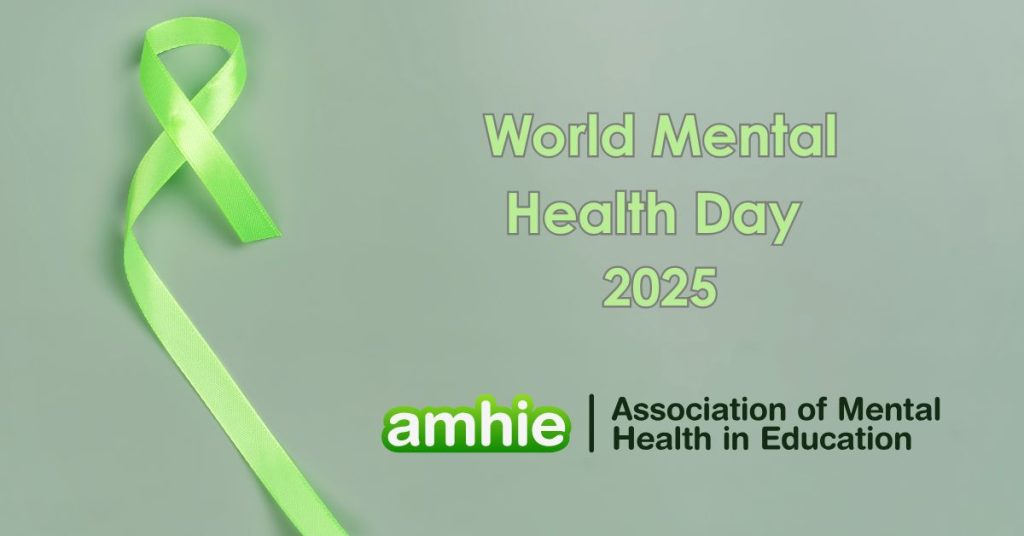
Today is World Mental Health Day and the theme is “Access to services: mental health in catastrophes and emergencies”
Each year on or around the 10th October, we raise awareness for global mental health through ‘World Mental Health Day”. The theme is set by the World Federation for Mental Health, but many organisations and charities join in, issuing resources, webinars and support for mental health.
Webinar: World Mental Health Day: Access to Mental Health in Emergencies
MIND – World Mental Health Day
Mental Health Foundation – World Mental Health Day
Globally, there is a lot going on so how can schools in the UK support their students with their mental health? We explore this complex subject…
The Unseen First Responders: Ensuring Mental Health Access in UK Education During Crisis
This World Mental Health Day, the spotlight falls on “Access to Services – Mental Health in Catastrophes and Emergencies.” While our minds might first leap to natural disasters or geopolitical conflicts, for UK schools, the concept of “emergency” is often closer to home. Yet, during these critical times, our educational settings and the incredible individuals within them frequently become the unseen first responders, offering vital mental health and psychosocial support.
The COVID-19 pandemic was an unprecedented global catastrophe that reshaped our understanding of emergency response in education. Overnight, schools pivoted, not just to deliver remote learning, but to maintain a semblance of normalcy, connection, and safety for millions of children and young people. The mental health fallout was immediate and profound. Studies by organisations like YoungMinds highlighted significant increases in anxiety, depression, and loneliness among students. The routine, social connections, and protective factors that school provides were abruptly severed, leaving many adrift.
But the pandemic also illuminated the essential, albeit often under-recognised, role of school staff. Teachers, teaching assistants, pastoral leads, and school counsellors became front-line mental health workers, supporting students struggling with isolation, bereavement, domestic stress, and the sheer uncertainty of the world. They adapted, innovated, and cared, often without adequate training or resources for such a monumental task, all while navigating their own personal anxieties and challenges.
The “crisis” of COVID-19 may have receded, but its mental health repercussions are far from over. We are now living with a “long tail” of distress throughout society. Economic instability, the cost of living crisis, and persistent global anxieties continue to impact families, creating a complex web of stressors that inevitably land at the school gate. Children and young people arrive in classrooms carrying burdens that affect their capacity to learn, socialise, and thrive. School staff continue to witness the downstream effects, managing increased behavioural challenges, heightened anxiety, and more complex safeguarding concerns – all symptoms of a society still grappling with collective trauma.
This ongoing reality underscores why ensuring robust mental health access within UK education during and after a crisis is not just beneficial, but absolutely critical. Schools are not merely places of academic instruction; they are community anchors, often the most stable and consistent presence in a child’s life. They are uniquely positioned to provide universal support, identify emerging needs, and connect students to more specialised services.
However, for schools to truly fulfil this role effectively, they need systemic support and recognition. This means investing in comprehensive staff training in psychological first aid, ensuring adequate provision of Senior Mental Health Leads, and critically, strengthening the pathways between school-based support and external services like Mental Health Support Teams (MHSTs) and CAMHS. It means acknowledging and actively safeguarding the mental well-being of our school staff, who cannot pour from an empty cup.
As we reflect on “Access to Services,” let us acknowledge the unseen first responders in our schools. Let us champion policies and resources that empower them, ensuring that when the next emergency strikes, our educational settings are not just safe havens, but fully equipped hubs for mental health and well-being, ready to support every student.
The Three Pillars of Crisis Response
For educators:
Pillar 1: Recognise the Signs (Observe & Listen)
- Changes in Behaviour
- Emotional Clues
- Look for significant changes from their usual self. Everyone reacts differently; there’s no “right” way to feel.
Pillar 2: Respond with Calm & Care (Connect & Reassure)
- Your Presence is Powerful – things you can do and say to help manage the situation
- Offering Practical Support
Pillar 3: Refer & Review (Escalate & Follow Up)
- When to Act Further
- Your School’s Pathways
- Team Approach: Remember, you’re not alone. Utilise your school’s support network.
For students/pupils:
Pillar 1: What You Might Notice in Yourself or Friends
- Body & Feelings
- How You Act
- Remember: Everyone reacts differently to tough times. These feelings are normal, but if they last a long time or feel too big to handle, it’s good to talk.
Pillar 2: Simple Ways to Feel Better
- Talk About It
- Look After Yourself
- Calm Your Body
- You’re Not Alone: Everyone needs help sometimes.
Pillar 3: Who Can Help You Here (In School)
- Talk to Someone
- You can also find support online:
- Childline: Call 0800 1111 or visit childline.org.uk
- YoungMinds: youngminds.org.uk (for young people and parents)
- Shout 85258: Text SHOUT to 85258 for free, confidential mental health support, 24/7.
- Remember: Asking for help is a sign of strength!
Download the A4 posters for your classrooms and hallways:
Like this resource? Get access to our full library and training with AMHIE Membership

AMHIE Educational Setting Membership ensures your staff maintain continuous proficiency in identifying and addressing threats to mental health and wellbeing. Members gain full access to a complete library of compliance-based CPD courses, expert toolkits, and evidence-based resources covering DfE/Ofsted compliance, Staff Wellbeing, and SEND. This essential package equips your setting to meet professional and legal obligations, reducing risk and burden through timely, actionable guidance.
The total annual saving on staff development, through full access to all member training courses, amounts to a massive £1239 + VAT per person!
Elevate your school’s mental health strategy and unlock these significant savings. Join AMHIE today!

